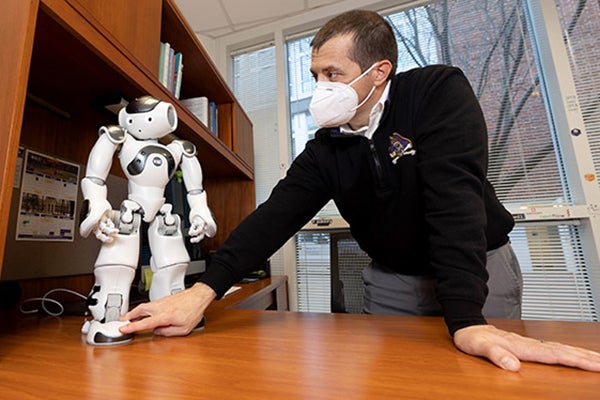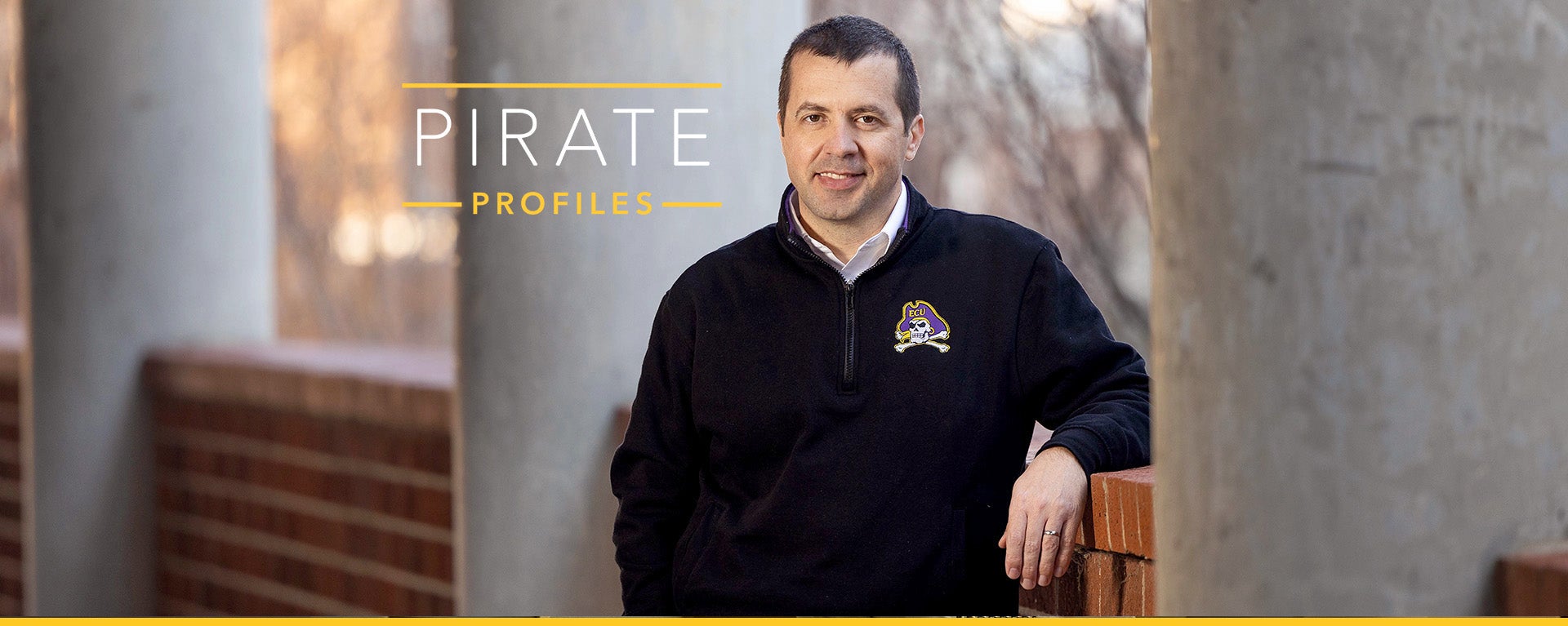Faculty: Dr. Nic Herndon
Dr. Nic Herndon focuses on artificial intelligence, machine learning and data science as an assistant professor in East Carolina University’s Department of Computer Science. But it’s his ability to unplug from the world of technology that helps him teach the next generation of computer scientists.
Instead of pounding away on a computer keyboard in his spare time, Herndon relishes his chance to explore parks, walking trails and all that eastern North Carolina has to offer.
“In the short time we’ve been in North Carolina, my wife and I have done quite a bit of traveling around the state,” Herndon said. “Our goal is to visit every county, starting with the ones in eastern North Carolina, where most of our students come from. There are so many beautiful places.”
He said some of their favorite spots include Cliffs of the Neuse State Park near Goldsboro, the Vollis Simpson Whirligig Park and the Botanical Gardens in Wilson, the waterfront at Union Point Park in New Bern and the Outer Banks.
“We do love Washington and the waterfront and also not too far from there, Goose Creek State Park, which is an overlooked attraction,” Herndon said. “Whenever we go there, we’re surprised there’s not more people considering how beautiful that place is.”

Dr. Nic Herndon works with a NAO robot in his office in the Science and Technology Building.
Herndon sees those moments away as crucial to his ability to not only teach students, but also to stay up to date on the many changes and innovations that take place almost daily in computer science as well as to conduct important research.
“I find there is a connection between exercise and learning,” Herndon said. “Exercise stimulates the brain, which helps with intensive thinking. Doing mathematics or anything like that, it helps to stimulate the brain through exercise.”
Herndon grew up in Cluj-Napoca, Romania, where he enjoyed camping trips with his family as well as vacations to the Black Sea or the nearby mountains. It’s one of the reasons he finds Greenville so appealing.
“It’s in a very nice geographic area,” he said. “It’s similar to where I grew up. It’s not too far from the ocean, and it’s not too far from the mountains, so it’s similar geography.”
Herndon said he was drawn to computer science in his youth.
“My parents bought a personal computer when I was in high school. I enjoyed interacting with it, and I got the passion for it,” he said. “Plus, in my high school, there were several specializations. Mine was in computer engineering, and I got to learn both the hardware and software aspects of computing.”
After earning an initial degree in civil engineering, Herndon obtained bachelor’s, master’s and doctorate degrees in computer science and worked in the industry for almost 15 years before turning to education.
“I worked in system administration so I had to explain to the computer users how to interact with the software to prevent errors, or if there was an error, to get input from the users about what had happened so I could replicate the error and troubleshoot it,” he said. “In explaining to them how to use the computer or how to use a particular component, I found it interesting to explain things, so that’s one of the reasons (I decided to teach).”
He explored teaching options and landed at ECU.
“It’s a great school, and in terms of the computer science department, I think it has so much potential, and I want to be part of the growth of the department,” Herndon said.
He said ECU’s computer science program is unique compared to many others because of the opportunities for collaboration, especially with the schools of medicine, dentistry, engineering and nursing. He said research at other programs may sometimes come at the expense of teaching, while research at ECU enhances classroom learning and offers opportunities to make differences in the lives of people in eastern North Carolina.
“We have undergraduates who are trying to get a good education; I think it’s likely they will receive a better education in computer science here than at other universities because of the research that we are doing,” he said. “We can showcase it to the students in the class so they can see cutting-edge and the latest technologies that are used in the field.”
Herndon’s research has varied, including award-winning research on the effectiveness of spam filters. He is the co-principal investigator on a National Science Foundation grant to create a personalized learning web application, ISPel. He is also the co-principal investigator on a grant from the U.S. Department of Agriculture to develop a web application for ecologists and biologists called CartograPlant. It’s designed to simplify the analysis of correlations between the genotype (DNA), the phenotype (traits) and the environment (precipitation, temperature, soil type, etc.) of plants.
He is working with the Brody School of Medicine on a project that uses machine learning to help predict cancer reoccurrence from medical images. In a project with the School of Dentistry, he uses machine learning on X-ray images to detect small gaps between teeth and bone that could deteriorate and lead to bigger problems later on.
“Currently a dentist or a specialist will have to look at the X-ray and pay attention to make sure they don’t miss teeth that have this condition,” Herndon said. “If it can be automated, someone in a dentist’s office can see it and automatically notify the dentist that a tooth has an issue rather than a dentist looking at all these X-rays to spot the condition.”
He said health care is just one of the many industries that rely on computer scientists.
“Computer science is used in so many different fields, and the number is just growing,” he said. “Think about automobiles and how much technology has been incorporated into cars in the last decade. Every aspect of life has to deal with technology. In manufacturing 4.0 where automation and computer science will play an important role, it’s expanding in a lot of different areas. Also, we’re collecting so much data in sensors and mobile devices, and companies are collecting data on their customers. We have a deluge of data, and we’re analyzing only about 1% of data. If we were to start analyzing more and find the patterns that are there, I think that would bring a lot of innovation in a lot of things. So, it’s definitely an exciting field in computer science.”
Herndon helps build that excitement as the faculty advisor for ECU’s student chapter of the Association of Computing Machinery.
“Its goal is to promote the discipline, and I thought this would be a good opportunity to have our students get a little bit of leadership experience,” he said. “I encourage them to present workshops on topics that they have either studied in class or outside of class to help other students in the department to learn more, so there are a lot of opportunities to do presentations that I think will help our students become leaders in their fields.”
Herndon also heads up the department’s student ambassadors, some of whom recently presented a program on the department’s NAO robots to Pitt County’s Innovation Early College High School.
“With the student ambassadors, I think it’s just such a great opportunity to interact with high school or prospective students and their parents at various events that are hosted by ECU,” he said. “It’s an opportunity for our students to develop leadership skills and also showcase our department.”
Herndon said the presentations and teamwork available to students through such organizations are what today’s computer scientists need. They no longer just sit behind a keyboard all day, but instead are engaged with many others to create user-friendly innovations that can change lives, something that always keeps the job interesting and moving forward.
“This is a trend that I think is going to continue in computer science for the foreseeable future,” he said. “I tell our students that they should be prepared for lifelong learning because in computer science, in order to stay current to what is going on, you always have to learn.”
FAST FACTS
Name: Dr. Nic Herndon
Title: Assistant professor, Department of Computer Science
Hometown: Cluj-Napoca, Romania
Colleges attended and degrees: Associate of Science in civil engineering, Technical University of Cluj-Napoca; Associate of Science in computer science, Truckee Meadows Community College; Bachelor of Science in computer science, University of Nevada at Reno; Master of Science in computer science, University of Nevada at Reno; Doctor of Philosophy in computer science, Kansas State University
PIRATE PRIDE
Years working at ECU: 2 1/2
What I do at ECU: I teach computer science and data science courses. I mentor undergraduate and graduate students on research projects in machine learning and data science. I am the faculty mentor for the Association of Computing Machinery student chapter and the faculty advisor for the Computer Science Student Ambassadors.
What I love about ECU: There are so many reasons. We have top quality students that collaborate well, and support and encourage each other. Our department has a lot of potential for growth, and I look forward to contributing to that growth. There are opportunities to collaborate with other departments — for example from the School of Dentistry and Brody School of Medicine — on real-world problems.
Research interests: My main research interests are in artificial intelligence, machine learning, big data analytics/data science, computational biology and bioinformatics.
What advice do you give to students? Take advantage of all the resources available on campus: office hours, tutoring services within our department and at the Pirate Academic Success Center, Speech Communication Center, Career Services, Center for Counseling and Student Development, ECU CARES, Language Academy and others. Get involved in student organizations and activities at ECU. Try to get at least one internship before completing your degree.
Favorite class to teach: I don’t have a favorite one, yet. I enjoy teaching all the classes I have taught so far.
QUICK QUIZ
What do you like to do when not working? I like to spend time with my wife. We enjoy taking short road trips throughout the state. Recently our favorite spots have been gardens and state parks. We also like to go for walks on the Greenville Greenways trails. Beside traveling and hiking, we like to cook together.
Last thing I watched on TV: “800 Words”
First job: I picked fruit.
Guilty pleasure: Dark chocolate
Favorite meal: Macaroni and cheese
One thing most people don’t know about me: Even though I’m a computer scientist, I don’t have many computing gadgets.
READ MORE PIRATE PROFILES:
